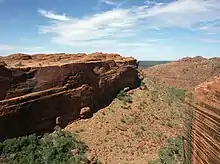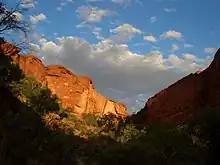24°15′29″S 131°33′45″E / 24.257995°S 131.562557°E



Kings Canyon, also known as Watarrka, is a canyon in the Northern Territory of Australia located at the western end of the George Gill Range about 321 kilometres (199 mi) southwest of Alice Springs and about 1,316 kilometres (818 mi) south of Darwin, within the Watarrka National Park.
Name
Kings Creek runs along the bottom of the canyon, and gives it its name. The creek was named by the explorer Ernest Giles in 1872. He wrote in his book Geographic Travels in Central Australia from 1872 to 1874: "I called King's Creek after Mr. Fielder King... an old and kind friend of mine".[1]
The Aboriginal (Luritja and Arrernte[2]) name for the creek and canyon is "Watarrka" (pronounced what-ARR-kah[3]), which is the Luritja word for the local umbrella bush (Acacia ligulata) that grows in the vicinity.[4] The national park thus gets its name from this landform.[2]
Location and access
Kings Canyon is located 321 kilometres (199 mi) southwest of Alice Springs via Larapinta Drive (only accessible by 4WD), or 474 kilometres (295 mi) along the Stuart Highway, Lasseter Highway, and the Red Centre Way, which are all sealed.[1]
Description

In 1986, Kings Canyon was listed on the Register of the National Estate, when it was described by the Department of Environment as follows:[5]
One of the most spectacular canyons in Central Australia. Kings Canyon contains some 60 rare or relict plant species and a total of 572 different plant species and 80 species of birds. It is a 'living plant museum' and is notable for its stands of cycads & permanent rock pools. There are some well-preserved Aboriginal paintings and engravings in the area...
The walls of Kings Canyon are over 100 m (330 ft) high, with Kings Creek at the bottom. Part of the gorge is an Aboriginal sacred site, and visitors are discouraged from leaving the walking tracks.
Three walks exist at Kings Canyon. The two km (return) and approximately one-hour Kings Creek Walk traces the bottom of the gorge. At the end of the walk is a platform, with views of the canyon walls above. The six km (loop) Kings Canyon Rim Walk traces the top of the canyon and takes three to four hours to complete.[6] A steep climb at the beginning of the walk, which locals call "Heartbreak Hill" (or "Heart Attack Hill", due to its steepness), takes visitors up to the top, with views of the gorge below and of the surrounding landscape. About half way during the walk, a detour descends to the Garden of Eden, a permanent waterhole surrounded by plant life. The last half of the walk passes through a maze of weathered sandstone domes, reminiscent of the Bungle Bungle. A slow descent brings the visitor back to the starting point. The loop can also be done in reverse (anti-clockwise), but the National Park Rangers encourage visitors to walk in one direction. Access to the walk may be restricted during hot weather.[7] The 22 km Giles Track connects Kings Canyon to Kathleen Springs and is popular with more adventurous hikers.
Birds that can be seen on the Kings Canyon Rim Walk include spinifex pigeon, zebra finch, grey-headed honeyeater, dusky grasswren, black-breasted buzzard and peregrine falcon.
Kings Canyon Solar Power Station was a photovoltaic power station with a generating capacity of 225 kWp and electricity production of 372,000 kWh of electricity per annum. It was the largest single installation of its kind in Australia when it began operation in December 2003.[8]
Geology
According to geologists, the valley was formed more than 400 million years ago. It cuts through a layer of Mereenie Sandstone, which was deposited here 400 million years ago. The sandstone can be viewed in the form of 30-m high cliffs, and as you go deeper, you can witness the softer Carmichael Sandstone, which has been present here for 440 million years. These two layers of sandstone are divided by a thin layer of purple shale or mudstone which depicts the environmental changes between the two formations.[9]
Kings Creek Station
Kings Creek Station was established by Ian and Lyn Conway in 1981. It lies 36 km (22 mi) from Kings Canyon, and offers accommodation and tourist experiences.[10] It was originally run as a cattle station and camel property, and still runs these animals, but tourism is now its main business. The property covers 2,200 km2 (850 sq mi), of which 100 km2 (39 sq mi) is freehold, with the remainder being a pastoral lease. Tony McFadzean took over as CEO and co-owner some time after the Conways retired in April 2019.[11]
In popular culture
King's Canyon featured in the 1994 film Priscilla, Queen of the Desert, as the rock climbed by the lead characters at the end of their trip of self-discovery.[12]
References
- 1 2 "Kings Canyon, NT". Aussie Towns. 17 January 2016. Retrieved 10 April 2023.
- 1 2 "Kings Canyon Tourism". Discover Central Australia. Retrieved 10 April 2023.
- ↑ "Kings Canyon Watarrka - Better than Uluru?". Travel Outback Australia. 27 January 2022. Retrieved 10 April 2023.
- ↑ "Watarrka". Central Art Aboriginal Art Store (in Indonesian). Retrieved 10 April 2023.
- ↑ "Watarrka (Kings Canyon) National Park, Ernest Giles Rd, Yulara (sic), NT, Australia - listing on the now-defunct Register of the National Estate (Place ID 190)". Australian Heritage Database. Australian Government. 25 March 1986. Retrieved 19 June 2019.
- ↑ Louise Southerden (14 September 2009). "King's Canyon Rim Walk, NT". Australian Geographic. Retrieved 3 August 2014.
- ↑ "Watarrka National Park". Parks and Wildlife Commission NT. Northern Territory Government. Retrieved 3 August 2014.
- ↑ Renewable energy Archived November 4, 2006, at the Wayback Machine
- ↑ "Watarrka National Park: The geology of Kings Canyon" (PDF). Northern Territory Government. Archived from the original (PDF) on 23 October 2021.
- ↑ "Home". Kings Creek Station. Retrieved 10 April 2023.
- ↑ "About Us". Kings Creek Station. 11 October 2020. Retrieved 10 April 2023.
- ↑ Byrnes, Paul. "The Adventures of Priscilla, Queen of the Desert: The Queens of King's Canyon" (video + text). National Film and Sound Archive of Australia. Retrieved 23 July 2023.